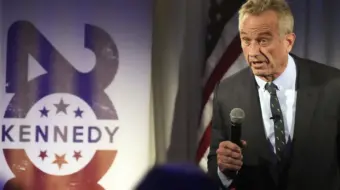Despite deep splits in Republican congressional ranks and opinion polls that show overwhelming public opposition, President Bush used the occasion of Tax Day to launch a nationwide blitz in a renewed effort to win major tax breaks for the top 1 percent of U.S. tax payers.
In a Rose Garden speech on April 15, Bush called for quick action by Congress. “We need tax relief totaling at least $550 billion to make sure our economy grows. And American workers and American businesses need every bit of that relief now,” he intoned. By the time Congress reconvened in late April, administration officials had traveled to 26 states, touting the cuts as a “growth and jobs” package designed to give an immediate boost to a floundering economy by creating more than a million jobs.
Bush’s attempt to re-energize his tax program came after a sharply divided Congress failed to agree on a budget resolution setting parameters for tax and spending priorities for fiscal year 2004. Instead, Congress acted in an unprecedented manner, adopting a resolution with two different tax cuts – the House voted for a cut of $550 billion, down from Bush’s original $726 billion request, while the Senate imposed a $350 billion cap on any cut.
The deadlock, resulting from the refusal of Sens. George Voinovich (R-Ohio) and John McCain (R-Ariz.) to toe the party line, created a situation where Vice President Dick Cheney had to break a 50-50 tie in the Senate in order to get the budget resolution passed. Now issues dealing with taxes and spending will be resolved – to the extent they can be resolved – in the weeks ahead as various congressional committees begin writing actual tax and spending legislation.
But even as he attempted to parlay a military victory in Iraq into support for his tax plan, Bush has been forced to make further concessions. On April 22, barely a week after launching a campaign that, he said, would “take as long as it takes,” administration officials said they were considering reducing the tax cut on dividends and Treasury Secretary John Snow indicated that he was willing to delay cutting the rate paid by the richest taxpayers.
Bush’s decision to resume the fight for his tax program was met by a firestorm of protest from labor and civil rights organizations, women’s and children’s advocacy groups and nationally-recognized economists, public figures, Wall Street financial institutions, and the Congressional Budget Office. Even the International Monetary Fund weighed in, calling the Bush tax cuts “awkwardly timed.”
Earlier, former Federal Reserve Chairman Paul Volcker and Robert Rubin, Treasury Secretary under President Clinton said the cuts were “not useful for short-term fiscal stimulus … nor would [they] spur long-term economic growth,” both reasons sited by Bush in his call congressional action.
One of the sharpest criticisms of the Bush plan came from Marian Wright Edelman, president of the Children’s Defense Fund, who said both budget resolutions approved by Congress represent misplaced national priorities. “Millionaires didn’t need the tax cut Congress gave them two years ago and they don’t need a new one now especially when there is a surge in jobless parents, more and more children are falling into extreme poverty, and a million American children are homeless each year.”
Ralph Neas, president of People for the American Way, said the White House needs a reality check, while Wade Henderson, executive director of the Leadership Council on Civil Rights, vowed a continued fight to ensure that the federal budget for fiscal year 2004 includes adequate aid to cash-strapped states.
In a statement issued on April 22, AFL-CIO President John Sweeney said the federation would launch a national campaign with a week long series of protests across the nation to expose the state-by-state impact of the Bush administration’s 2004 budget and to defeat irresponsible tax cuts. “We can’t allow Congress to push ahead on tax cuts that favor an elite few while working families and our states have to choose between giving up health care, safety programs or education.”
The Urban Institute-Brookings Institution Tax Policy Center has challenged White House claims that 92 million taxpayers will receive an average tax cut of $1,083 in 2003.
According to the institute, the average tax cut for tax filers in the middle fifth of the population would be $256 in calendar year 2003, 80 percent of tax filers would receive less than the $1,083 cut the administration trumpets and nearly half – some 49 percent of tax filers – would receive a cut of $100 or less.
The same analysis shows that the top one percent of tax filers would receive an average tax cut of $24,100 in 2003 and those with incomes of more than $1 million would get tax cuts averaging $90,200.
Paul Krugman, an economist for The New York Times, pooh-poohed Bush claims that his program will create jobs, saying: “The average American worker earns only about $40,000 a year. Why does the administration, even on its own estimates, need to offer $500,000 in tax cuts for each job? If it’s all about jobs, wouldn’t it be cheaper just to have the government hire people?”
The author can be reached at fgab708@aol.com












Comments